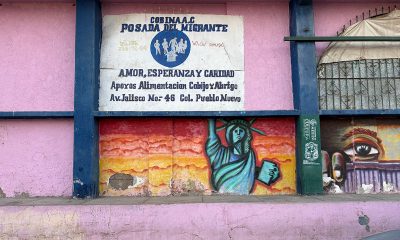News
Blinken reaffirms Biden administration’s pledge to champion global LGBTQ rights
Secretary of state delivered speech at State Department on Wednesday
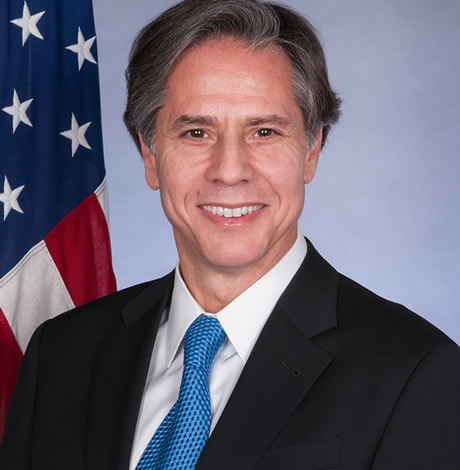
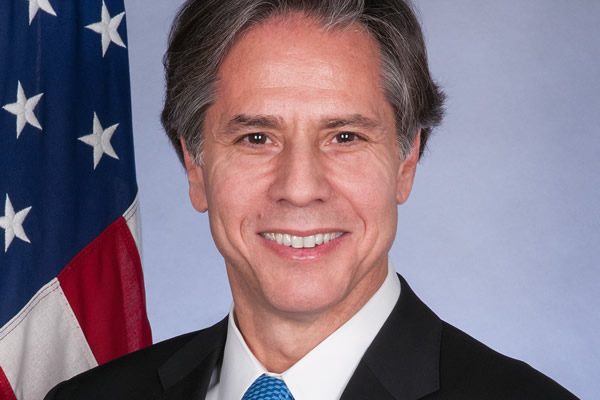
WASHINGTON — Secretary of State Antony Blinken on Wednesday reaffirmed the Biden administration’s foreign policy will promote LGBTQ rights around the world.
“We will stand firm behind our commitments to human rights, democracy, the rule of law,” said Blinken in a speech he delivered at the State Department. “And we’ll stand up against injustice toward women and girls, LGBTQI people, religious minorities, and people of all races and ethnicities.”
President Biden last month issued a memorandum that committed the U.S. to promoting LGBTQ rights abroad.
The Obama administration in 2011 issued a similar directive. The Trump White in 2019 tapped then-U.S. Ambassador to Germany Richard Grenell to lead an initiative that encouraged countries to decriminalize consensual same-sex sexual relations.
Blinken during his confirmation hearing pledged to raise the position of special U.S. envoy for the promotion of LGBTQ rights abroad within the State Department’s Bureau of Democracy, Human Rights and Labor to an ambassador level position. Blinken also said he would “repudiate” the Commission for Unalienable Rights — which sought to stress “natural laws and natural rights” — that his predecessor, Mike Pompeo, announced.
The State Department last month told the Blade it is “troubled” by reports that Russian authorities arrested two brothers from Chechnya who fled an anti-LGBTQ crackdown and returned them to their homeland. A State Department spokesperson in January described the caning of two men in Indonesia’s Aceh province whose neighbors caught them having sex as “an extreme form of punishment.”
Los Angeles
The TransLatin@ Coalition campaigns for $20 million to support new housing initiative
If approved, the funds will go towards homelessness prevention
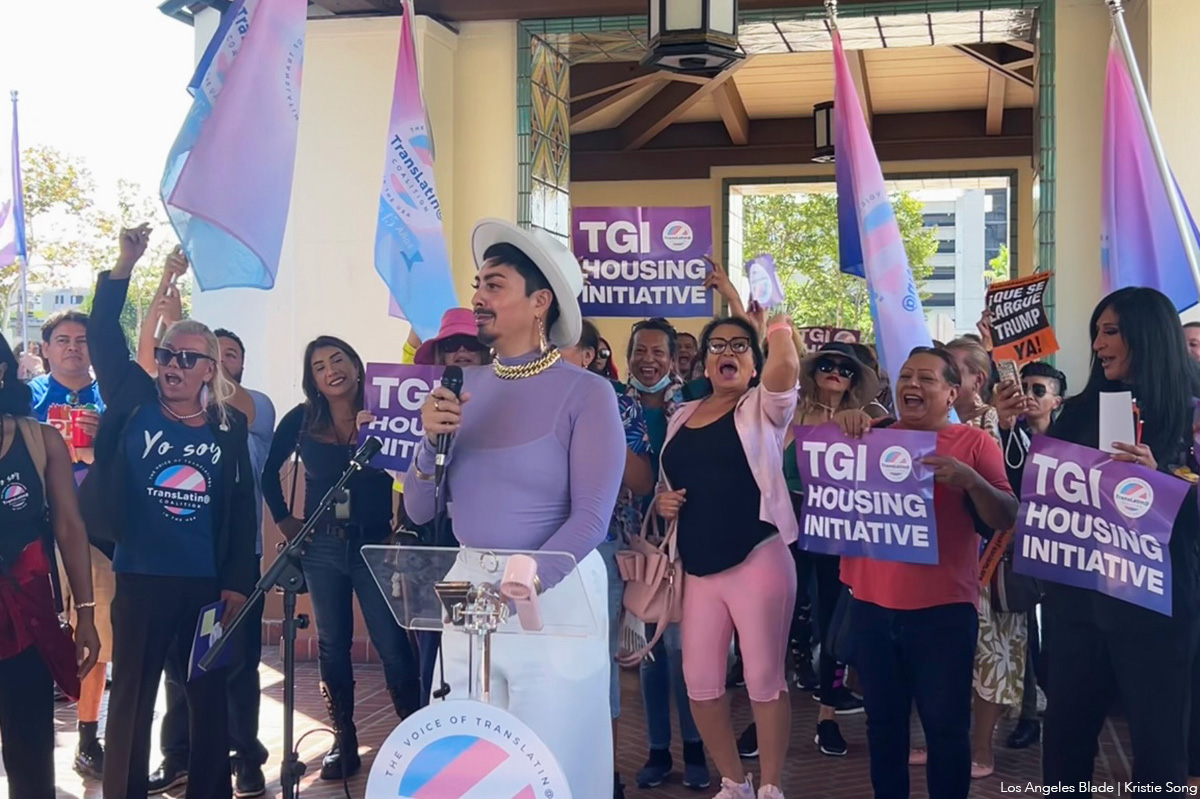
On Wednesday afternoon, over 50 people gathered in the heat outside the Metropolitan Water District. They waved large transgender pride flags and chanted at the top of their lungs: “Aquí está la resistencia trans!” Here is the trans resistance.
Leaders of the TransLatin@ Coalition (TLC), an organization formed by transgender, gender-expansive and intersex (TGI) Latine immigrants to support their fellow community members, led these jubilant calls for action at their press conference yesterday.
TLC organized this event to announce the launch of their new campaign, the TGI: Housing initiative. The group hopes to partner with the Los Angeles County Affordable Housing Solutions Agency (LACAHSA), an organization that was established in 2023 after the passing of SB 679: a bill aimed to increase affordable housing in the region.
What is TLC asking for? $20 million to invest into their communities. If approved, the funds would be allocated towards homelessness prevention resources like housing rental assistance and legal support clinics, specifically for TGI system-impacted individuals, seniors, transitional age youth, disabled community members and immigrants. “We are investing in people, not just programs,” said Queen Victoria Ortega at the press conference. Ortega is a chief visionary officer for the Connie Norman Transgender Empowerment Center.
“Housing is the foundation for opportunity,” Ortega continued. “When you are able to be in a safe, warm home, you’re able to take your medications. You’re able to take a respite. You’re able to think about the next step that you’re going to take. And really, why wouldn’t you want that for your neighbor? I end with saying: invest in trans lives.”
Authors of a June 2024 report published by the Williams Institute, a research center that informs public policy for LGBTQ+ communities, found that 47% of trans and nonbinary adults in the county live below 200% of the federal poverty level and face significant food insecurity and housing instability.
TLC is calling upon LACAHSA to utilize money from Measure A, a countywide half-cent sales tax that went into effect this April. The measure, meant to address the county’s homelessness crisis, generates over $1 billion annually and 33.75% of these funds are provided to LACAHSA. This amounts to over $380 million for the organization.
“Right now is the time for us to be invested in. We have a federal government who is trying to erase our existence,” said Bamby Salcedo, president and CEO of TLC, to the crowd. “That is why we’re calling on the LACAHSA board to commit to community engagement and partnership to ensure that this funding is community-led and that it is invested in all of us.”
Then, Salcedo led another chant. “Can we do it? When I say ‘People,’ you say ‘Power!’ People!” “Power!” Their voices carried like bells across the courtyard: a loud, clear and unbroken chorus.
As the press conference came to an end, TLC leaders encouraged community members to attend the LACAHSA board meeting happening right after, at 1 p.m. ChiChi Navarro, an active local advocate and a policy intern at TLC, explained how to make the most of their allotted minute during public comment. “Focus on your experiences,” said Navarro. “Focus on what you’ve gone through whenever you’ve tried to acquire housing. We understand that as a community, sometimes we’re affected simply for being who we are — and they need to listen to that. We are here in numbers so we won’t be silenced. Aquí está la resistencia trans!”
Many walked into the board room together at the Metropolitan Water District. Over ten community members took to the podium to share their personal experiences with homelessness, in both Spanish and English.
“As transgender, non-conforming and intersex individuals, we face unique challenges, especially those of us who are people of color, disabled or trans women who’ve experienced violence,” said Arianna Taylor, who was unhoused for three years. “$20 million allocated for TGI housing represents more than just funding. It represents hope, dignity and safety for people who, like me, have been forced to navigate a world of violence, stigma and exclusion.”
As Salcedo and her fellow TLC staff wait to hear more updates from LACAHSA, they will return to their work: empowering their community. “I’m really grateful that people are understanding that they have to advocate for themselves,” Salcedo told the Blade. “It is important for us to speak about what our needs are, and also try to find a solution. And please do come to our organization and see how we can support you.”
Mongolia
UN urges Mongolia to do more to protect LGBTQ+ rights
Discrimination, lack of legal recognition undermine progress
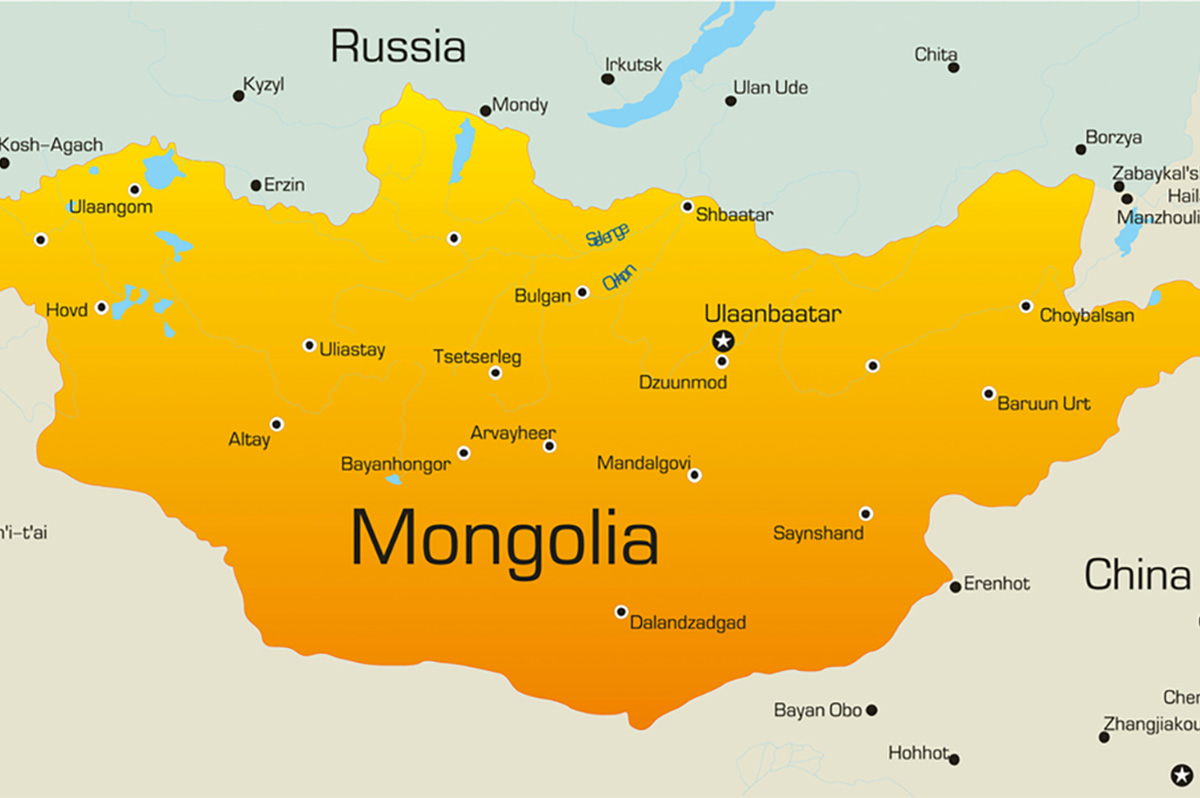
The U.N. earlier this year urged Mongolia to bolster protections for LGBTQ+ and intersex people, warning that entrenched discrimination and gaps in legal recognition continue to undermine recent progress.
In its Concluding Observations on the Fifth Periodic Report of Mongolia, the U.N. Human Rights Committee cited unreported attacks, bias in law enforcement, and the absence of rights for same-sex couples as barriers to equality in the country.
Mongolia has made measurable strides toward LGBTQ+ inclusion: decriminalizing consensual same-sex sexual relations, and outlawing discrimination based on sexual orientation and gender identity in its labor and criminal codes. Hate crime provisions allow for tougher penalties, and transgender people can amend legal documents to reflect their gender, though only after medical intervention. Mongolian law, however, stops short of recognizing same-sex marriages or civil unions, offers no status for nonbinary people, and provides limited protection for queer parents, leaving much of the community without full legal equality.
The Human Rights Committee also faulted Mongolia for the weak enforcement of its broader anti-discrimination framework, noting that few complaints reach the courts and prosecutions remain rare — a gap that limits remedies for LGBTQ+ people, despite legal protections on paper. The committee urged the government to widen the definition of discrimination, ease the burden of proof for victims, and raise public awareness about how to seek redress, alongside strengthening the reach and diversity of its National Human Rights Commission.
The U.N. Human Rights Committee has urged Mongolia to adopt sweeping anti-discrimination laws that protect people from bias in both public and private life, specifically including sexual orientation and gender identity. It also called for strong legal remedies and recommended that judges, prosecutors, and law enforcement officials receive proper training on discrimination, alongside broader efforts to raise public awareness about how victims can seek justice.
The report also called on Mongolia to intensify efforts to combat stereotypes and prejudice against LGBTQ+ and intersex people. It urged authorities to ensure that acts of discrimination and violence targeting them are thoroughly investigated, that perpetrators are prosecuted and, if convicted, receive appropriate penalties, and that victims are granted full reparations.
The committee further recommended guaranteeing freedom of peaceful assembly for LGBTQ+ and intersex people, including during the annual Equality Walk at Chinggis Square in Ulaanbaatar, the Mongolian capital, ensuring that any restrictions are applied fairly and in line with international standards. The report also highlighted the need for legislation that recognizes and protects same-sex couples.
The U.N. report also raised alarms over restrictions on peaceful assembly in Mongolia, citing accounts that authorities have curtailed demonstrations critical of the government as well as gatherings in support of LGBTQ+ and intersex rights. While acknowledging a draft revision of the 1994 law on demonstrations and assembly that would shift to a notification system, the committee warned a proposed requirement for police authorization to use main roads could undermine those reforms. It further expressed concern about reports of disproportionate force and arbitrary detentions during protests, and about a pending bill to amend the Criminal Code to impose prison sentences on those obstructing mining or other development projects, which could erode protections for the right to peaceful assembly.
Authorities on Dec. 4, 2024, arrested Naran Unurtsetseg, editor-in-chief of Zarig.mn, an independent news site, and held her for 68 days on charges that included contempt of court and spreading false information after she criticized judges and a prosecutor online. The arrest took place weeks after the General Judiciary Council urged an investigation into her remarks, and the site was briefly blocked ahead of her detention. The case has drawn sharp criticism from press freedom groups over the misuse of criminal defamation laws to stifle critical journalism in Mongolia.
Erdeneburen Dorjpurev, deputy director of the LGBT Center in Mongolia, told the Los Angeles Blade that in recent years her organization has handled several cases in which police officers themselves perpetrated prejudice, discrimination, abuse and harassment against LGBTQ+ people.
“These cases often make up around 30 percent of our referrals,” Dorjpurev noted.
She cited a 2022 incident in which officers allegedly forced their way into a gay couple’s home without a warrant, physically assaulted and verbally abused them, and mocked their sexual orientation. Dorjpurev said the officers also demanded access to the couple’s personal devices and, after obtaining it, circulated intimate videos among themselves and to others, deliberately humiliating the pair because of their identity.
“The survivor of this incident refrained from reporting this incident due to a fear of further harassment and abuse from the police,” Dorjpurev told the Blade. “The police officers in this incident, deliberately treated the couple with hostility, using derogatory terms in referring to their sexual and gender orientation. The police abused the position and power to humiliate the survivors by treating them inhumanely due to their own prejudice and discrimination against the LGBTQI+ community.”
Dorjpurev said the U.N. Human Rights Committee report underscored persistent mistreatment of LGBTQ+ people in Mongolia by police and healthcare providers. She noted incidents of discrimination and inhumane treatment “are still not being taken seriously and are often refused as official complaints,” leaving victims with little recourse. Dorjpurev added her organization urged authorities to expand scrutiny of human rights conditions for LGBTQ+ people in detention facilities, prisons, military bases, and other closed institutions, stressing the need to ensure those spaces are safe for sexual and gender minorities.
“While the Criminal Code includes provisions that sanction discrimination based on sexual orientation and gender identity, we still lack the proper tools to protect and support individuals. Even today, we still struggle in safe reporting, file complaints against any discriminatory acts,” Dorjpurev told the Blade. “This is due to the fact that individuals are still refused service from state services, still treated unfairly as well as still face harassment and discrimination from service providers. There is still a culture where an individual’s private information is disclosed without their consent, especially around their sexual orientation and gender identity. Further, service providers additionally utilize derogatory terms to shame and embarrass individuals, as well as repeatedly ask unnecessary, provoking questions around their gender and sexual orientation and identity.”
Dorjpurev further noted that, given this climate, most LGBTQ+ people in Mongolia are reluctant to seek help from state agencies or even private service providers, fearing further mistreatment or denial of their basic rights. Legal assistance is also scarce, she said, as few lawyers or other professionals focus on human rights and anti-discrimination cases.
Dorjpurev recalled a lawyer who collaborated with the LGBT Center on a case in 2019 faced harassment and discrimination simply for representing an LGBTQ+ client.
Dorjpurev highlighted that, to date, there has not been a single successfully resolved case of discrimination under Article 14.1 of the Criminal Code.
The LGBT Center in 2019 filed a complaint against a high-ranking state official who abused his authority to remove the organization’s posters from buses during Equality and Pride Days and posted anti-LGBTQ+ content on social media. Dorjpurev noted prosecutors at multiple levels rejected the case, despite many complaints.
“In Mongolia, despite not following ‘Western’ conversion therapy, we have our traditional Shamanic religion as well as Buddhism which still heavily influences our society,” she said.
“We have been referred to cases where community members have been subject to religious conversion — this mostly impacts those under the age of 18 where their parent or guardian believes they are suffering from a mental illness or other forms of health issue therefore forces them into meeting religious figures and shamans.” added Dorjpurev. “This is because the parent or the guardian often believe that they would be able to ‘pray away’ or ‘wash away’ their queer identity. These kinds of practices are often repeated on a daily basis having a severe impact on the mental wellbeing of their children; in some incidents these children are forced into having sexual intercourse with the opposite sex in order to ‘make them straight.’”
The LGBT Center in 2021 worked on the case of an gay 18-year-old who was told he would be burned with a hot stone and whipped if he did not become straight and gender conforming. Dorjpurev noted this man “was also referred to be sent to a psychiatrist where he was administered various different psyche-altering medications.”
Dorjpurev emphasized a key step for the Mongolian government is to demonstrate genuine commitment to LGBTQ+ and intersex rights and to transparently engage with civil society organizations. She noted that while various policies and laws have been introduced in the name of protecting LGBTQ+ and intersex people, these measures have largely excluded direct input from human rights defenders, limiting their effectiveness and accountability. Dorjpurev added these policies would have a stronger impact if developed in genuine consultation with civil society, ensuring concrete human rights provisions.
The LGBT Center, the National Human Rights Commission, and the Ulaanbaatar mayor’s office in 2024 co-organized a roundtable to discuss LGBTQ+ and intersex rights. Dorjpurev said this collaboration made the 2024 and 2025 Equality Marches possible.
She told the Blade that such examples demonstrate the benefits of consistent engagement with NGOs to build meaningful civic space and translate Mongolia’s commitment to equality into practice.
Dorjpurev called on international organizations, particularly the U.N., to continue supporting activists through in-person advocacy, technical assistance, and by improving both physical and language accessibility. She urged the U.N. to strengthen its role in monitoring the implementation of treaty body recommendations, working closely with the Resident Coordinator’s Office, and ensuring in-country teams engage directly with NGOs. Dorjpurev stressed that national-level dialogue must be inclusive, bringing together government agencies, civil society organizations, the U.N. Development Program, UNICEF, and other relevant U.N. bodies to guarantee meaningful participation and accountability.
“International NGOs also have a critical role to play,” said Dorjpurev, who specifically praised ILGA World, ILGA Asia, COC Nederland from the Netherlands, and other NGOs. “But more INGOs need to step up to support local civil society organizations in engaging with UN mechanisms.”
West Hollywood
“Will you own your deceit?” West Hollywood community members denounce city’s decision to lower flags for Charlie Kirk
Local residents packed last night’s city council meeting to voice their anger
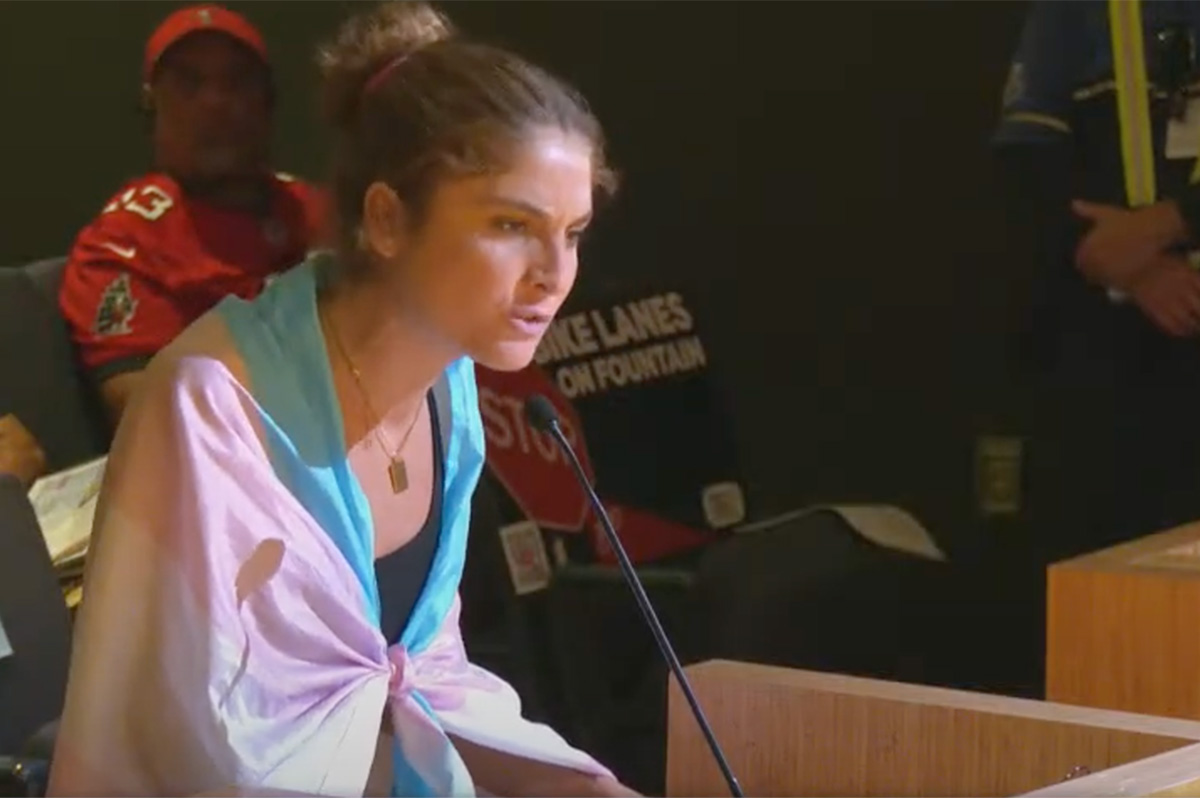
On Monday evening, West Hollywood residents packed the city’s council chambers ahead of the city council meeting. When the room opened up for public comment, several people loudly voiced their upset at the city’s decision to uphold President Trump’s recent proclamation, which ordered that U.S. flags at all public buildings and grounds be lowered to half-staff for four days following the death of Charlie Kirk.
Kirk was killed on Wednesday, September 10th, and was a prominent right-wing political activist, public speaker, and social media figure who gained popularity by participating in political debates with college students that were shared across YouTube, Instagram, and TikTok. He founded Turning Point USA in 2012, an organization dedicated to spreading conservative ideologies amongst young people. With over 18 million followers across Instagram and X, Kirk often took to the internet to share his anti-LBGTQ+ stances. He opposed same-sex marriage, called the need for gender affirming care a “mental disorder,” and supported the burning of Pride and Black Lives Matter flags.
When West Hollywood, a city that has long been home to much of the county’s LGBTQ+ communities, complied with the proclamation to honor Kirk’s death — community members were outraged.
Local resident Shannon Axe took the podium at last night’s meeting and called the decision “devastating.” She spoke of her own experience as a transgender woman, and how she is dedicated to supporting trans youth in an increasingly difficult social climate. “For me and for many others, these flags are not just fabric. They are a lifeline,” Axe continued, as applause reverberated around the room.
“They tell us ‘you are safe here. You are valued here. You belong here.’ To lower them in recognition of someone who has denied our humanity felt like erasing our dignity.”
Another community member, Nik Roybal, read from a poem they wrote in light of the city’s recent action. “Government, will you own your deceit? Government, will you witness our hurt, pain, anger, sadness? Why did you lower the flags for a terrorist, a white Christian nationalist?” Roybal recited. “This flag, this brown body, will not be lowered for a terrorist who wanted me and our siblings dead. Not in our name. To a city and a people that I love — not in our name.”
After public comment concluded, city manager David Wilson echoed a sentiment from the city’s official statement: that the City’s decision to comply with the presidential proclamation was not an endorsement of Kirk’s beliefs. Rather, it was following city protocol and United States Code.
But, Wilson clarified, that even traditional customs like this should be subject to more complex consideration if they present harm to local community members. “Thoughtful consideration should be taken to update this policy,” Wilson said. “I acknowledge that this decision has caused pain and frustration for many people in our community.”
Updates to the city’s flag policy will be discussed at the October 20 city council meeting.
Los Angeles
LGBTQ+ proponents respond to “devastating” Supreme Court ruling
Supreme Court allows “unlawful” immigration operations to continue

Since June, federal agencies began conducting mass immigration operations in Los Angeles and other major cities. For just as long, local residents, leaders, and advocacy groups have challenged their arrest and detainment practices, citing that their methods have violated constitutional rights.
In July, individual workers were joined by organizations like the Los Angeles Worker Center Network and the Coalition for Humane Immigrant Rights in filing a lawsuit against the Department of Homeland Security (DHS), arguing that federal agents had been illegally arresting people based on their perceived race, language and work — a violation of the Fourth Amendment.
As a result, two temporary restraining orders were issued, barring federal agents from stopping individuals without reasonable suspicion. DHS was also ordered to provide access to legal counsel for detainees.
On Monday, the Supreme Court voted to end this and granted the federal government’s application for a stay — or pause — of the temporary restraining orders. This will allow immigration operations to continue, and how they will proceed worries local leaders.
“This Supreme Court ruling strikes at the heart of who we are as a nation—allowing immigration agents to stop and detain people for little more than speaking Spanish or having brown skin,” wrote District 51 Assemblymember Rick Chavez Zbur, a longtime advocate for LGBTQ+ civil liberty. “This endangers our communities, undermines our democracy, and erodes constitutional rights.”
Some city officials hope to continue providing resources and support to affected community members. “As the raids were taking place across the region and in our own City, we took immediate action to ensure there are adequate resources to care for and support immigrants and their families,” wrote West Hollywood mayor Chelsea Byers. “This work will continue.”
West Hollywood was one of several Los Angeles county municipalities that filed a motion to intervene in the ongoing lawsuit, calling for the court to stop the federal government from conducting unlawful stops and searches that were based on assumed race and not on probable cause. It also activated its West Hollywood Responds program to raise awareness on available services like legal toolkits and training, consultations, access to free meals and more.
Local organizations are also extending their support. “The Supreme Court’s ruling is a devastating setback for Latine and immigrant communities, especially LGBTQ+ people who already face immense barriers to safety and belonging,” wrote Terra Russell-Slavin, the Los Angeles LGBT Center’s chief strategy officer. Russell-Slavin explained that the center has expanded free legal clinics both virtually and throughout the city to provide Know Your Rights workshops and other immigration and asylum support services.
“You are not alone,” Russell-Slavin continued. “And the Center will continue to stand with you.”
On September 24, the federal district court will hold a hearing to consider additional evidence and a possible preliminary injunction that will pause this most recent ruling.
Kristie Song reports for the Blade courtesy of the California Local News Fellowship
National
Military families challenge Trump ban on trans healthcare
Three military families are suing over Trump’s directive cutting transgender healthcare from military coverage
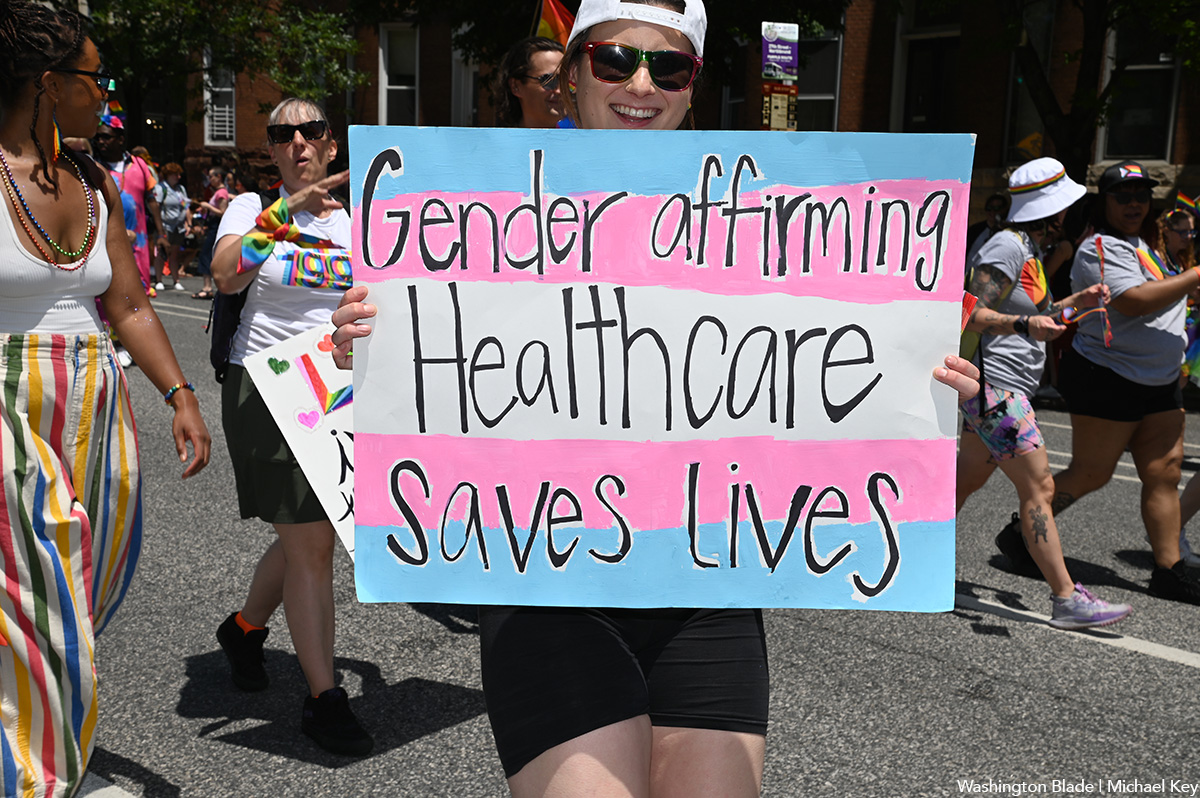
Three military families sued the Department of Defense on Monday after President Trump’s anti-transgender policies barred their transgender adolescent and adult children from accessing essential gender-affirming medical care.
The lawsuit, filed in the U.S. District Court for the District of Maryland, challenges the legality of the Trump administration’s decision to ban coverage of any transgender-related medical care under Department of Defense health insurance plans.
Under the new directive, military clinics and hospitals are prohibited from providing continuing care to transgender adolescent and adult children. It also prevents TRICARE, the military’s health insurance program, from covering the costs of gender-affirming care for both transgender youth and young adults, regardless of where that care is received.
A press release from the families’ attorney explained that the plaintiffs are proceeding under pseudonyms to protect their safety and privacy. They are represented by GLBTQ Legal Advocates & Defenders (GLAD Law), the National Center for Lesbian Rights (NCLR), Brown, Goldstein & Levy, LLP, and Keker, Van Nest & Peters LLP.
“This is a sweeping reversal of military health policy and a betrayal of military families who have sacrificed for our country,” said Sarah Austin, Staff Attorney at GLAD Law. “When a servicemember is deployed and focused on the mission they deserve to know their family is taken care of. This Administration has backtracked on that core promise and put servicemembers at risk of losing access to health care their children desperately need.”
“President Trump has illegally overstepped his authority by abruptly cutting off necessary medical care for military families,” said Shannon Minter, Legal Director at NCLR. “This lawless directive is part of a dangerous pattern of this administration ignoring legal requirements and abandoning our servicemembers.”
“President Trump’s Executive Order blocks military hospitals from giving transgender youth the care their doctors deem necessary and their parents have approved,” said Sharif Jacob, partner at Keker, Van Nest & Peters LLP. “Today we filed a lawsuit to put an end to his order, and the agency guidance implementing it.”
“This administration is unlawfully targeting military families by denying essential care to their transgender children,” said Liam Brown, an associate with Keker, Van Nest & Peters. “We will not stand by while those who serve are stripped of the ability to care for their families.”
National
Supreme Court sides with transgender boy in bathroom access fight
Plaintiff challenging SC law

On Wednesday, the U.S. Supreme Court ruled that a transgender boy may use the boy’s bathroom in a South Carolina public high school while pursuing a challenge to a state law that requires students to use the bathrooms corresponding to their sex assigned at birth.
The order, which was unsigned by any of the justices, did not provide reasons for the court’s decision, but made clear that it applied only to the one student in this case. The order specifically stated that it was “not a ruling on the merits of the legal issues presented in the litigation” and was instead “based on the standards applicable for obtaining emergency relief.”
It should be noted that Justices Clarence Thomas, Samuel A. Alito Jr., and Neil M. Gorsuch filed dissents to the order, though they did not provide any explanation for their opposition.
This is not the first time the highest court in the nation has addressed trans rights in the country.
In 2020, the Supreme Court ruled in Bostock v. Clayton County that federal law prohibits anti-trans discrimination in employment. Despite this significant victory for trans rights, in June the court upheld a Tennessee law banning gender-affirming medical care for trans minors in U.S. v. Skrmetti. That ruling, which suggested the court could be used to remove protections for trans people, has contributed to increased scrutiny and the reconsideration of previous rulings favorable to trans rights, placing broader LGBTQ protections at risk.
The recent order comes as the Supreme Court prepares to hear two cases involving trans athletes and their rights to participate in sports under Title IX, the federal civil rights law that prohibits discrimination based on sex in educational programs and activities that receive federal funding. Advocates for trans rights have expressed concern that these upcoming cases could further challenge the legal landscape surrounding gender identity in schools and other public institutions.
National
Trump to honor Charlie Kirk with Medal of Freedom
Anti-LGBTQ political activist assassinated in Utah on Wednesday
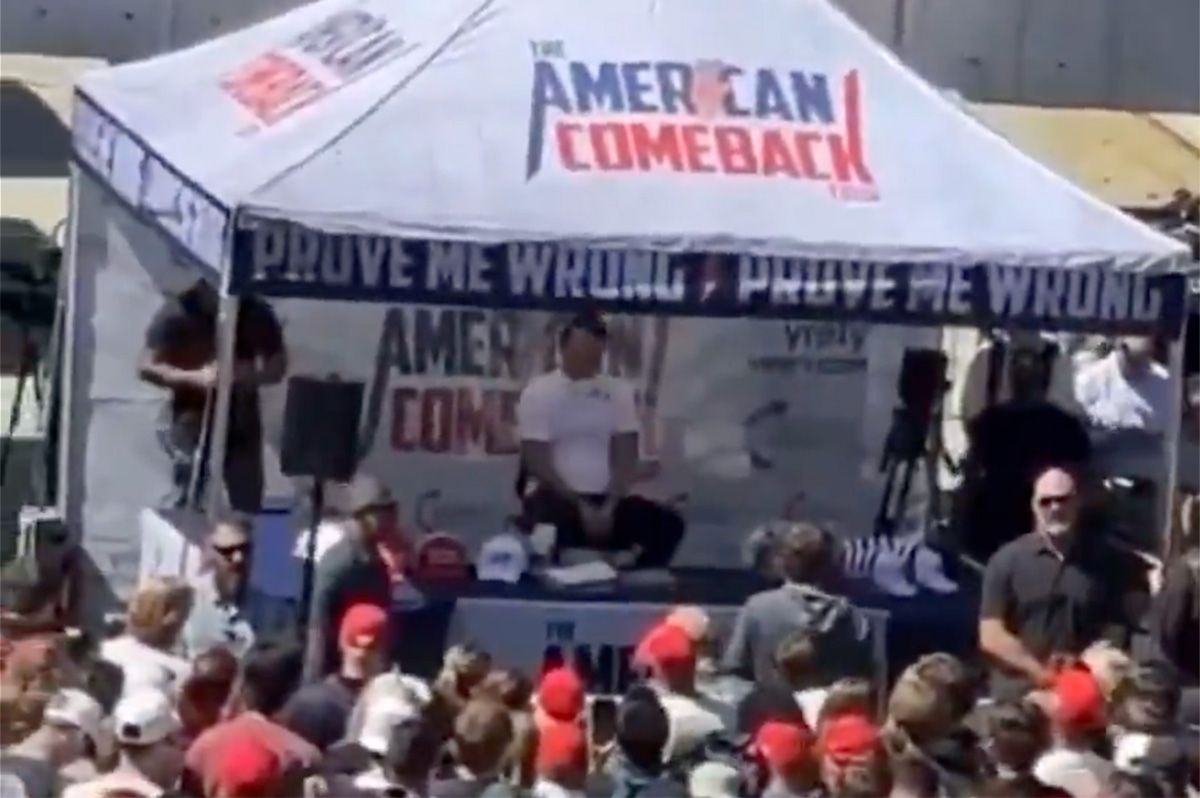
At a Sept. 11 remembrance ceremony at the Pentagon on Thursday, President Donald Trump announced that he will award right-wing political activist Charlie Kirk the Presidential Medal of Freedom.
Kirk was assassinated less than 24 hours earlier at Utah Valley University while speaking on conservative talking points to a crowd.
The 31-year-old conservative commentator is best known for founding Turning Point USA, a nonprofit that sought to build a robust conservative youth movement. He earned notoriety for his unwavering loyalty to Trump, his advocacy of expansive Second Amendment rights, and his opposition to LGBTQ rights. Conservatives and far-right supporters have quickly elevated Kirk to martyr status since his death.
“Before we begin, let me express the horror and grief so many Americans feel at the heinous assassination of Charlie Kirk,” Trump said. “Charlie was a giant of his generation, a champion of liberty, and an inspiration to millions and millions of people.”
As of now, there is no indication when the award ceremony will take place, although Trump said “I can only guarantee you one thing, that we will have a very big crowd.”
Many credit Kirk with helping Trump return to the White House in 2024 by mobilizing young voters — particularly young men — on behalf of the twice-impeached president.
Kirk’s stance against LGBTQ rights was a central part of his political brand.
A staunch opponent of Obergefell v. Hodges, the landmark Supreme Court ruling requiring states to recognize same-sex marriage, Kirk often used incendiary rhetoric, at times calling for the erosion of LGBTQ rights altogether.
As host of “The Charlie Kirk Show” on the Salem Radio Network, he frequently denounced transgender participation in sports, referring to trans people and their supporters as “sick.” He also suggested they should be “taken care of like how things in the 1950s and 60s” were — an allusion many critics interpreted as a reference to lobotomies, shock therapy, and forced institutionalization.
Kirk often framed his views through the lens of “Christian values.”
On his YouTube channel, he invoked biblical passages, at one point citing Leviticus 20:13 to claim that the Bible’s call for the stoning of gay men reflected “God’s perfect law.”
The Washington Blade contacted several LGBTQ advocacy organizations for comment on Trump’s decision to posthumously honor Kirk, a man widely criticized for his hostility toward the LGBTQ community. Many focused instead on condemning the violence that ended his life.
“Political violence is unacceptable and has no place in this country,” said Kelley Robinson, president of the Human Rights Campaign, in an emailed statement. “We cannot ever accept this epidemic of gun violence as normal. We cannot keep living like this.”
Kristen Browde, president of the Florida LGBTQ+ Democratic Caucus, which has 21 chapters across the state, making it one of the largest LGBTQ caucuses in the nation, echoed those sentiments while pointing to the consequences of Kirk’s rhetoric.
“Political violence, for any reason, is wrong. Gun violence, for any reason, is wrong. Spending your life, inciting violence, demonizing political opponents? Attacking those who are different? Every bit as wrong. And when violence follows such actions? One can’t be shocked. All you can do is recommit yourself to fight against it.”
According to videos — and witnesses at Utah Valley University, Kirk was shot seconds after beginning to answer a question about how many”transgender” people were responsible for “mass shootings,” where he answered “too many.”
As of Thursday evening, Kirk’s killer remained at large. The FBI has identified a person of interest in its investigation and is offering a $100,000 reward for information leading to an arrest.
Utah
Charlie Kirk shot to death at Utah university
Anti-LGBTQ figure asked about trans shooters moments earlier

Charlie Kirk, a right-wing political activist, outspoken anti-LGBTQ figure, and founder of Turning Point USA, a conservative nonprofit, was shot and killed at Utah Valley University in Orem, Utah on Wednesday.
The 31-year-old was visiting the university’s Turning Point USA chapter and speaking to a large outdoor audience when he was struck in the neck by a single bullet fired from about 200 yards away. NBC reported that no suspect is in custody, despite university police previously indicating otherwise. President Trump announced Kirk’s death on social media.
Just moments before the shooting, an audience member asked Kirk, “How many transgender Americans have been mass shooters over the last 10 years?”
“Too many,” Kirk replied—seconds before being shot. Videos of the graphic incident have since gone viral online.
Kirk had long opposed LGBTQ rights and publicly opposed same-sex marriage. He frequently cited his “Christian values” as the basis for his positions, often quoting Leviticus 20:13 (“men lying with men… abomination”) as “God’s perfect law” on sexual matters.
He was also a prominent national voice in efforts to ban transgender healthcare, saying, “Donald Trump needs to run on this issue.” Kirk further proclaimed, “Pride is a sin,” and dismissed “gay corporations that hate America.”
On his YouTube show, he declared there are “only two genders” and described “transgenderism and gender ‘fluidity’ … lies that hurt people and abuse kids.” He also warned that LGBTQ efforts would not stop at marriage equality but instead aimed to “corrupt your children,” according to Media Matters for America.
Utah Valley University, established in 1941 as Central Utah Vocational School, is the state’s largest public university, with more than 46,000 students. It is located about 40 miles south of Salt Lake City.
National
Concerns for future emerge at U.S. Conference on HIV/AIDS
‘I’m done being treated like shit in the country I grew up in’

More than 2,400 people, including public health experts, scientists, physicians, local government officials, and community activists, turned out for the 29th annual United States Conference on HIV/AIDS, which took place Sept. 4-7 at the Marriott Marquis Hotel in D.C.
Organized by the D.C.-based group NMAC, formerly known as the National Minority AIDS Council, the conference is considered the nation’s largest and most comprehensive gathering of experts involved in addressing the HIV/AIDS epidemic in the U.S.
NMAC spokesperson Pavni Guharoy said NMAC officials will be completing a final count of the conference participants based on registration numbers later this week, but she said the current estimated attendance was at least 2,500.
The conference included more than 100 workshop sessions that focused on a wide range of issues related to the status of the HIV/AIDS epidemic in the U.S., with a focus on the large and growing number of people living with HIV who are 50 years of age or older.
Information released at the conference shows that as of 2022, of the nearly 1.1 million people living with HIV in the U.S., approximately 54 percent were 50 years of age or older.
Many of the sessions addressed the needs, concerns and sometimes stigma faced by diverse communities of people living with HIV and those at risk for HIV, including African American, Latinx, and LGBTQ communities, both those who are aging as well as young adults.
The conference also included four plenary sessions in which all conference attendees listened to two-dozen prominent keynote speakers. Among them was former U.S. National Institutes of Health official Dr. Anthony Fauci, who pointed out that continuing advances in HIV research have led to effective medical intervention that changed AIDS from a once fatal illness to a condition in which people with HIV can live “a normal life span.”
Other keynote speakers included Earvin ‘Magic’ Johnson, the acclaimed basketball player who became an advocate for people with HIV after testing positive for HIV 33 years ago, and Dr. Rachel Levine, who made history by becoming the first out transgender person to be confirmed by the U.S. Senate in 2021as an appointee by then-President Joe Biden as a U.S. Assistant Secretary of Health.
Also speaking was Jeanne White-Ginder, the mother of Ryan White, who was diagnosed with AIDS in 1984 at the age of 13 from a blood transfusion. White-Ginder told conference attendees how Ryan faced discrimination when he was initially barred from going to his school in Indiana out of fear that he could transmit the virus to others at school.

In a moving presentation, she told how Ryan became one of the nation’s early advocates for people with HIV/AIDS up until the time of his death in 1990, one month before his high school graduation. She said then-U.S. Sen. Edward Kennedy (D-Mass.) invited her to come to Washington to help lobby for a bill Kennedy introduced and which Congress passed in her son’s honor called the Ryan White Comprehensive AIDS Resources Emergency (CARE) Act in August 1990.
“Now, today, thanks to your hard work and dedication, Ryan’s bill and your bill, too, provides treatment and support to more than half a million Americans in big cities, small towns and rural communities across the country,” she said. “It has dramatically reduced suffering. It has enabled people to live with HIV, to live long and healthy lives.”
But White-Ginder joined the many conference speakers, including Magic Johnson, in calling on attendees and the public to urge Congress to reject the dramatic cuts in funding for federal AIDS programs, including the Ryan White program, proposed by President Donald Trump and Republican congressional leaders for the Fiscal Year 2026 federal budget.
Among those calling on the AIDS community and allies to speak out against the proposed budget cuts were Paul Kawata, NMAC’s outgoing executive director and CEO, who is retiring Oct. 7, and Harold Phillips, the former director of the White House Office of National AIDS Policy during the Biden administration and current NMAC Deputy Director for Programs who was chosen to succeed Kawata as NMAC CEO.
NMAC officials, led by members of its board of directors, praised Kawata for his 36 years of service as NMAC’s leader and his dedication to the cause of service and support for people with HIV and AIDS.
Kawata reflected on his work at NMAC and his concerns over the current political climate in Washington in a sometimes-emotional farewell address at one of the conference’s plenary sessions on Sept. 5.
“I’ll be honest with you. After 36 years the thought of leaving all of you is much more difficult than I thought it was going to be,” he told the gathering. “You are my family. You are the people that I love,” he said.
“You taught me how to be a better version of me. And I am so extraordinarily grateful for everything that you have given me,” he continued. “And you will always be a part of my heart.”
Pointing to members of the NMAC staff, both current and former members in the audience, Kawata said, “NMAC is NMAC because of what you do every single day with your life. You fight to make a difference in the world. And I am honored and privileged to call you my friends.”
Without mentioning the Trump administration by name, Kawata had harsh words for what he said was happening now in the United States and its impact on people living with HIV.
“I’m not going to lie to you,” he said. “I’m done being treated like shit in the country that I grew up in. I’m done being told that I’m a second-class citizen because of who I love,” he continued. “It’s not my America anymore. And I’m worried for our future.”
He added, “We always talk about the pendulum of justice, about the arc of justice. And I really want you to know in this moment, as difficult and as awful and how hellacious it is, we are on the right side of history. We are the ones who will change the world.”

In his remarks at the conference’s closing Sept. 7 plenary session, Fauci said, “We’re in very difficult times. You don’t need me to tell you that. But we’ve got to continue to put the pressure on what we did in the ‘80s with the activist groups, to make sure we do end the epidemic.”
He noted that he was at his job as director of the U.S. National Institute of Allergies and Infectious Diseases in the early 1980s, when the AIDS epidemic first surfaced and the AIDS patients he and his colleagues cared for, had little chance of survival.
“Fast forward now, 44 years, extraordinary things have happened,” Fauci said. “We now have drugs that you are all very aware of that can have an individual living with HIV live essentially a normal life span in putting under the care and the availability of drugs,” he continued.
“We know what U equals U – something that we didn’t imagine some years ago. That undetectable equals untransmissible,” he said, referring to the current HIV medication that suppresses the HIV virus to an undetectable level that prevents an infected person from transmitting it to someone else.
“And right now, with these drugs that we have for the prevention of HIV we have what we actually hoped for years ago – and that is to end the HIV epidemic,” he said.
Dr. Rachel Levine, who during the Biden administration served in the dual role as Assistant Secretary of Health at the U.S. Department of Health and Human Services and as director of the U.S. Public Health Service Commissioned Corps, also spoke at the closing session of the conference.
She noted that she began her career as a pediatric physician in 1983 in New York City, at the time of the early stages of the AIDS epidemic. From that time through her years as Assistant Secretary of Health, Levine said she observed first-hand the skills and dedication of doctors, nurses, and others who cared for people with HIV/AIDS who she described as the HIV care workforce.

“The HIV care workforce since that time has been incredibly dedicated, with many people working for decades,” she said. “And working to end the HIV epidemic in the United States and around the world. We applaud you. You are in this room. We applaud you arduously for your dedication and for your passion.”
Levine also noted that the cuts in funding and large-scale federal worker layoffs brought about by the Trump administration have had a direct impact on the HIV care workforce.
“Many dedicated public health leaders, including most of the HIV and infectious disease team who I worked with in my office at HHS have had their positions eliminated,” she said. “These hard-working civil servants went to work every single day to support the health and wellbeing of all Americans, including those living with HIV.”
She added, “And we know that there are shortages in HIV care. And it is so critical at this challenging time that we support you, the HIV care workforce.”
Many conference attendees said Magic Johnson played a leading role in boosting morale and spirit at the 2025 U.S. Conference on HIV/AIDS by his inspirational speech at the Sept. 5 plenary session.
Upon receiving a prolonged, standing ovation after being introduced as the next speaker, Johnson said, “When I think about 33 years living with HIV in a moment that changed my life forever. And what a blessing to be here 33 years later to tell that story at a time when there was only one drug.”
Johnson added, “Wow, and they said it probably is a death sentence for myself, and I had to wrap my arms around making the toughest decision I probably had to make in my life, which was to retire from the NBA.”
Among other things, Johnson said his doctors told him that while he was physically capable of continuing to play basketball, the stress of an 80-game season could impact his immune system and lower his T-cell count.

With the support of family, friends, and his community, Johnson said he miraculously survived the early days without a known fully effective HIV drug. And at the request of community activists, he agreed to speak out as a well-known figure and a person with HIV to inform “my community,” especially people of color, he said, about how to live with HIV and how uninfected people can lower their risk.
“But what I do, I adhere to my doctor. I take my meds. I work out, and then I love life and myself,” he said.
In response to the challenge facing people with HIV under the current political situation, Johnson said, “We got to pull ourselves together and continue this fight, because it’s important and we got to keep this at the forefront. Now, HIV and AIDS kind of slipped back. We got to bring it back up.”
Among other things, he said the nonprofit foundation he helped to form has “given away over $15 million” in grants to HIV/AIDS organizations. “And we will continue to do that because of the work you are doing.”
He received another thunderous applause and standing ovation upon the completion of his speech.
Phillips, who will succeed Kawata as NMAC’s CEO on Oct. 7, told the Washington Blade he believes this year’s U.S. Conference on HIV/AIDS was “extraordinary” under difficult circumstances.

“I think so, because this year we did this without a lot of federal support,” he said. “And many of the attendees – the federal government, HRSA, the Ryan White program told them they couldn’t use their grant funds to attend the conference, which was a shame.”
Phillips added, “But I think with a crowd of over 2,400, some people found a way to be here regardless and thought that it was important, and the topic was important enough. And I think our listening sessions, our workshops, our plenaries hopefully gave them what they needed to continue to be activated to serve people living with HIV. “
“And also gave them a sense of hope, especially in these dark times that we can continue to work to end the HIV epidemic,” he said.
West Hollywood
Holloway Kitchen: Turning West Hollywood’s former IHOP into a hub for queer resilience and opportunity
Holloway Kitchen turns a vacant West Hollywood IHOP into a training hub for unhoused, queer, and immigrant residents, providing skills, jobs, housing support, and a voice in shaping systems that have long failed them.
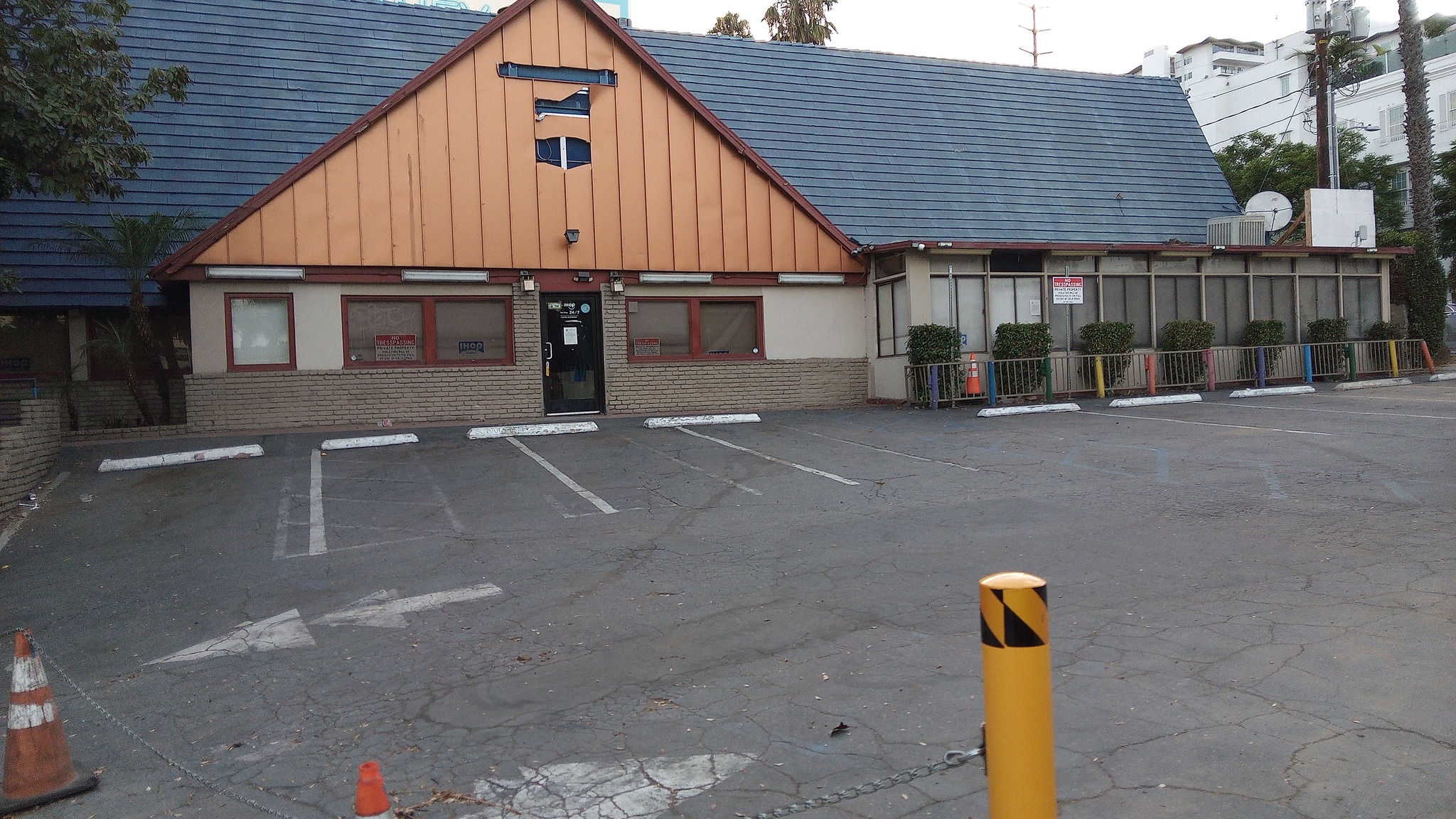
Homelessness in Los Angeles is not the result of personal failure. It is a predictable outcome of systemic inequities that push people to the margins while wealth and power concentrate elsewhere. Queer and immigrant communities often carry the heaviest burden. West Hollywood, long a site of queer resistance and organizing, now faces that crisis at its doorstep.
A new initiative, Holloway Kitchen, aims to respond. Proposed by Holloway Housing, the project would transform the long-vacant IHOP at 8461 Santa Monica Boulevard into more than a restaurant. It is designed as a community hub where food becomes a vehicle for structural change—offering training, jobs, and support to unhoused residents in West Hollywood.
“Holloway Kitchen is about dignity and empowerment,” said Jerry Soper III, founder of the project. “We are not just opening a restaurant; we’re creating pathways for people to build stability while being part of a community.”
The project is intended to work with residents of the nearby Holloway Interim Housing Program, managed by Ascencia, providing culinary and hospitality training through a proposed 12-week program. Graduates could secure jobs at Holloway Kitchen itself or with local partners such as SUR Restaurant, The Abbey Food & Bar, Mother Wolf, and the Hollywood Food Coalition.
Central to the vision is a commitment to those who face the steepest barriers. “LGBTQ+ youth face a 120% higher risk of homelessness,” Soper explained. “In Los Angeles, transgender individuals make up a significant portion of unsheltered populations. Holloway Kitchen aims to address these barriers with tailored support, flexible schedules for transition-related needs, and advocacy for queer youth facing housing discrimination.”
The restaurant itself would embody that same commitment to safety and affirmation. Plans include gender-neutral restrooms, a zero-tolerance harassment policy, and comprehensive LGBTQ+ sensitivity training for staff, in partnership with The Trevor Project and the Los Angeles LGBT Center. “We want every person who walks into Holloway Kitchen—whether as a trainee, employee, or customer—to feel affirmed and welcome,” Soper said.
Equally important, unhoused people will have a voice in shaping the project. Soper has convened an advisory board of Holloway House residents and alumni, including queer youth, immigrants, and trans women, to guide decisions on training, housing partnerships, and workplace culture.
Holloway Kitchen also seeks to honor West Hollywood’s legacy of queer organizing. “This project is inspired by the AIDS crisis response, when the community rallied to provide care, advocacy, and support,” Soper explained. Planned educational displays and events will highlight queer pioneers and the city’s history of resilience, blending historical reverence with forward-looking innovation.
The project is currently seeking $825,000–$1,075,000 in startup funding for renovations, staffing, and equipment, with a goal of opening in 2026. While the vision is ambitious, the City of West Hollywood underscored that it remains in the proposal stage. “The proposer has not, to date, been connected to the City, its service providers, or the property owner regarding this idea, and establishing these connections is a necessary prerequisite to consideration,” said Joshua Schare, City spokesperson. “We welcome the proposer to reach out to the City’s Human Services Division to discuss it further.”
Soper envisions the impact for participants: “In a year, a young queer person who comes to us with no job and no home could be thriving with stable employment, safe housing, and a support network. They would feel empowered to give back, becoming part of West Hollywood’s legacy of resilience.”
If successful, Holloway Kitchen could become a replicable model for addressing homelessness at the intersections of queerness, poverty, and immigration—providing a community-driven path toward opportunity where systems have historically failed. For now, it stands as a proposed initiative that seeks to reclaim power, restore dignity, and prove that survival is possible through solidarity and hope.
-
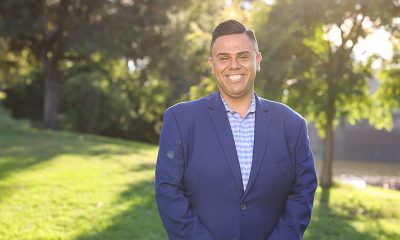
 AIDS and HIV3 days ago
AIDS and HIV3 days agoAssemblymembers urge Governor Newsom to sign “lifeline” bill for HIV medication
-

 Theater4 days ago
Theater4 days agoThe Palm Springs historic Plaza Theatre to reopen, celebrating its past by looking to the future
-
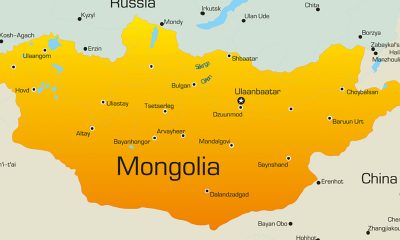
 Mongolia2 days ago
Mongolia2 days agoUN urges Mongolia to do more to protect LGBTQ+ rights
-

 a&e features4 days ago
a&e features4 days agoSandra Bernhard unpacks her anecdotal “Shapes & Forms” live show and why it’s more important than ever to reach straight audiences
-
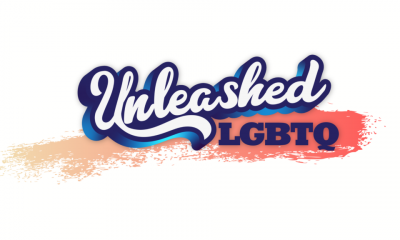
 a&e features2 days ago
a&e features2 days agoC’mon, Dallas! Wesley Smoot brings Unleashed LGBTQ+ queer business conference & festival to the Lone Star State
-
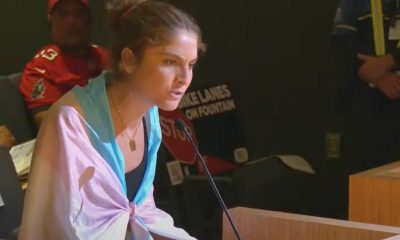
 West Hollywood2 days ago
West Hollywood2 days ago“Will you own your deceit?” West Hollywood community members denounce city’s decision to lower flags for Charlie Kirk
-

 Movies2 days ago
Movies2 days ago‘The Rocky Horror Picture Show’: Michael Varrati on why the queer, camp classic still resonates 50 years later
-

 Arts & Entertainment3 days ago
Arts & Entertainment3 days agoA very queer night at the Emmys
-

 Movies3 days ago
Movies3 days agoShort film explores little-known corner of AIDS history
-

 COMMENTARY6 hours ago
COMMENTARY6 hours agoFrom rhetoric to renewal: How we heal America together

